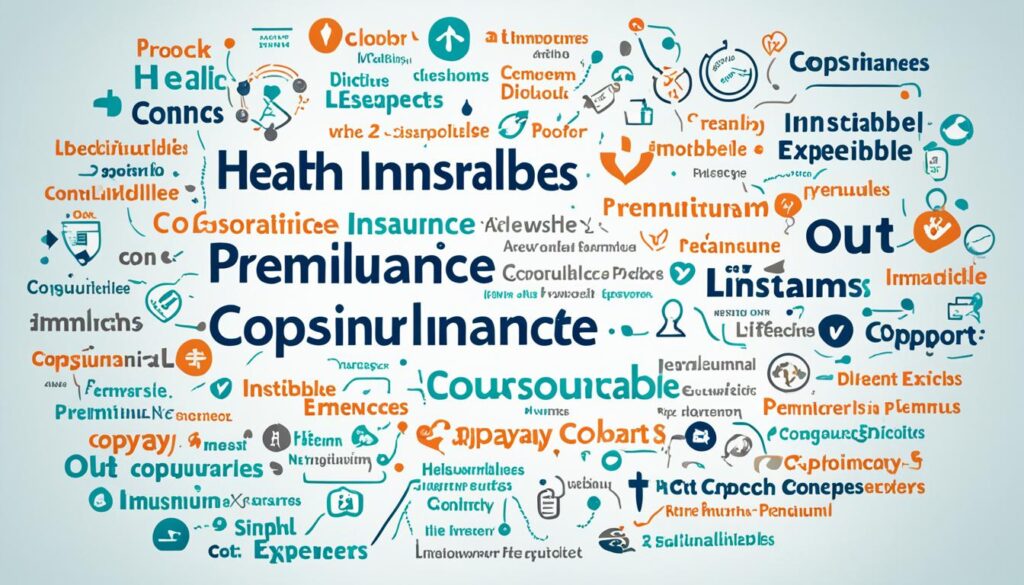Choosing the right insurance policy is key to protecting your finances and those of your loved ones. This guide will help you find the best policy for your needs and budget. You’ll learn how to pick from insurance marketplace options, compare health insurance plans, and understand policy benefits and costs.
This knowledge will help you make a smart choice and get the right insurance policy.
Key Takeaways
- Understand your insurance marketplace options, including employer-provided plans and state/federal health insurance exchanges.
- Compare different types of health insurance plans, such as HMOs, PPOs, EPOs, and POS plans, to find the best fit.
- Evaluate the insurance plan network and assess the coverage of out-of-pocket costs, premiums, and deductibles.
- Review the scope of services covered by the insurance policy to ensure it meets your healthcare needs.
- Consider life insurance policy options and determine the appropriate level of coverage for your financial goals.
- Research and choose a reputable insurance provider with a track record of reliable service and customer satisfaction.
- Thoroughly review the policy documents and disclosure information to understand the terms and conditions of the insurance coverage.
Understanding Your Insurance Marketplace Options
Choosing the right health insurance is key. If your job offers health insurance, it’s a good deal. But if not, you’ll look at state or federal marketplaces under the Affordable Care Act.
Employer-Provided Insurance Plans
Many jobs offer health insurance as a perk. These plans are often cheaper because the employer pays part of the cost. Working with your job’s insurance can make things easier and give you more plan choices.
State and Federal Health Insurance Marketplaces
If your job doesn’t offer insurance, check out the government’s marketplace. This is also known as the Affordable Care Act (ACA) marketplace. Here, you can look at and sign up for health plans. You might get help with costs if you qualify. You can also buy insurance from private companies, but you won’t get financial help there.
“The health insurance marketplace is a one-stop shop to find and compare private health insurance options.”
Knowing your options is the first step to picking the best health insurance for you and your budget.
Comparing Types of Health Insurance Plans

When looking at health insurance, it’s key to know the different types. Each plan has its own benefits and costs that affect your healthcare. Let’s dive into the main differences between HMOs, PPOs, EPOs, and POS plans.
HMO: Health Maintenance Organization
HMOs are known for their low out-of-pocket costs. But, you must use doctors within their network and get referrals for specialists. This setup helps keep costs down but might limit your choice of doctors.
PPO: Preferred Provider Organization
PPOs let you see both in-network and out-of-network doctors. But, seeing out-of-network doctors costs more with higher copays and deductibles. You can pick your own doctors without needing referrals.
EPO: Exclusive Provider Organization
EPOs are like HMOs but you don’t need referrals to see specialists. They offer a balance between HMO cost savings and PPO flexibility permanent life insurance department of insurance universal life homeowners insurance liability insurance auto insurance permanent life insurance policy cash value of the policy type of coverage personal property higher cost certificate of insurance amount of insurance variable life insurance health insurance policy insurance company pays insurance agent or broker.
POS: Point of Service Plan
POS plans mix HMO and PPO features. You can see out-of-network doctors but it costs more. You also need referrals to see specialists in the network.
Knowing what each plan offers can help you pick the best health insurance for your needs, budget, and preferences.
Evaluating Health Plan Networks

Choosing a health insurance plan means looking at the in-network providers. These are doctors and places that work with the insurance company. This means you pay less when you see them. Make sure your local doctors or hospitals are in the provider directory of your plan.
Think about the size of the network, especially if you live in a rural area. A big network means more choices for in-network care. This is great if you need special treatment or live where healthcare is limited.
But, know how the plan handles out-of-network providers too. Sometimes, you might need to see doctors outside the network. Knowing how much you’ll pay for these visits can help you decide general policy health insurance may additional premium insurance also use primary face amount of coverage would face financial hardship single policy could cost policies are sold renew the policy damage to your car cost of rebuilding insurance company’s policy helps extra cost health plans may medical costs policy remains fire insurance build cash value policy without purchase a policy.
“Carefully evaluating a health plan’s provider network can help ensure you have access to the care you need, while also minimizing your out-of-pocket expenses.”
Look at the plan’s in-network providers, your local doctors, and out-of-network coverage. This way, you can pick a plan that fits your health needs and budget.
Assessing Out-of-Pocket Costs

When picking a health insurance plan, it’s key to know the out-of-pocket costs you might face. These include health insurance premiums, deductibles, copays, and coinsurance. Understanding these health insurance terms helps you make a smart choice. It ensures you find the right mix of monthly costs and coverage.
Understanding Health Insurance Terms
Premiums are what you pay regularly to keep your health insurance. Deductibles are the upfront costs you pay before your insurance kicks in. Copays are set costs for certain medical services. Coinsurance is the share of costs you pay with your insurance after your deductible is met.
Balancing Premiums and Out-of-Pocket Expenses
Plans with higher health insurance premiums usually have lower out-of-pocket costs. This means lower deductibles, copays, and coinsurance. On the other hand, plans with lower premiums might have higher out-of-pocket costs. Think about your healthcare needs and find a plan that balances your monthly costs with the coverage you need.
“Choosing the right health insurance plan is a balancing act between managing your monthly costs and ensuring adequate coverage for your healthcare needs.”
Reviewing Plan Benefits and Coverage
Choosing an insurance policy means more than just looking at costs. You must understand what services the policy covers. Check the details on preventive care, emergency services, prescription drugs, and any special treatments you might need.
Scope of Services Covered
Some insurance plans offer more benefits in certain areas. This could be great if you have specific health needs. For example, a plan with strong emergency care coverage is good if you live in a disaster-prone area.
Also, a plan with lots of preventive care benefits is good for keeping healthy through regular check-ups and screenings.
Don’t forget to look at the plan’s prescription drugs coverage. Some plans might only cover a few medications, while others offer more options. If you or a family member needs certain prescriptions, this is important to consider.
| Plan Benefits | Coverage Details |
|---|---|
| Preventive Care | Annual check-ups, cancer screenings, immunizations |
| Emergency Care | Emergency room visits, ambulance services, urgent care |
| Prescription Drugs | Generic and brand-name medications, specialty drugs |
| Specialized Treatments | Physical therapy, mental health services, maternity care |
By looking closely at the insurance plan benefits and scope of coverage, you can choose a plan that meets your health needs and preferences.
Insurance Policy Considerations for Life Insurance

When looking at life insurance, it’s key to think about what you really need. You might want to protect your family, save for your kid’s school, or plan for retirement. Knowing what you want from life insurance helps pick the best policy.
Assessing Your Life Insurance Goals
Start by thinking about your family’s daily costs, debts, and future financial needs. This helps figure out how much life insurance you should get. Life insurance can be a key way to replace your income, helping your family keep their lifestyle and reach their goals.
Calculating Optimal Insurance Cover
- Estimate your annual household expenses, including mortgage/rent, utilities, and other essential costs.
- Factor in any outstanding debts, such as student loans or credit card balances.
- Consider future financial obligations, such as your children’s education or your retirement needs.
- Determine the appropriate life insurance coverage and term length to meet these requirements.
By looking at your life insurance goals and figuring out the best coverage, you can pick a policy that protects your family. This could be a term life insurance or whole life insurance plan.
“Life insurance is not about you, it’s about the people you love and want to protect.”
Choosing a Reputable Insurance Provider
Choosing the right insurance provider is key. Your policy’s worth depends on the insurer’s claim handling and customer service. Look for these signs to find a trustworthy company:
- Insurance Company Ratings: Check ratings from agencies like AM Best, Moody’s, or Standard & Poor’s. High ratings mean they can pay their debts.
- Claim Settlement Ratio: A high ratio means they settle claims quickly and fairly. This shows they care about customer happiness.
- Customer Reviews: Read what others say online about their service, claim handling, and satisfaction.
Researching a company’s reputation, ratings, and claims history helps you pick a reliable partner. Your policy’s strength depends on the company’s reliability.
“An insurance policy is only as good as the company that stands behind it.”
Looking into an insurer’s reputation ensures your policy will be honored and claims handled well when you need it.
Disclosure and Policy Document Review

Before you sign your insurance policy, make sure to read the full policy document. This ensures you know about the insurance policy terms, policy exclusions, policy riders, policy deductibles, and the policy lock-in period.
Telling your insurer about any health issues or dangerous hobbies is key. This helps avoid claim denials later. By reading the policy carefully, you can make sure it meets your needs. This way, you won’t face any surprises later.
Here are some important things to check in your insurance policy document:
- Understand the insurance policy terms and conditions, including any limitations or exclusions.
- Examine the policy riders and make sure they provide the additional coverage you require.
- Familiarize yourself with the policy deductibles and how they will affect your out-of-pocket costs.
- Verify the policy lock-in period to ensure you can make changes or switch providers if needed.
By taking the time to review your insurance policy document, you can rest easy. You’ll know you’ve made a smart choice and are covered if you need to make a claim.
Also Read: What Are The Different Types Of Liability Insurance?
“Reviewing your insurance policy document is a crucial step in ensuring you have the right coverage for your needs.”
Conclusion
Choosing the right insurance policy is key to your financial health. It’s important to know the insurance market, compare plans, and look at costs and benefits. This way, you can pick a plan that fits your needs and budget. Also, picking a trustworthy insurance company is crucial for reliable service and fair claims handling.
In this guide, we’ve covered the main things to think about when picking an insurance policy. We talked about insurance coverage, insurance premiums, and the need to read policy details and check the provider’s reputation. By doing these things, you can make sure your insurance claims are handled right and your money is safe.
It’s smart to spend time looking at your insurance choices. This can give you peace of mind and protect your finances for you and your family. With the right insurance policy, you can enjoy life knowing you’re ready for whatever comes your way.
FAQs
Q: What factors should I consider when choosing an insurance policy?
A: When choosing an insurance policy, you should consider factors such as your insurance needs, budget, coverage options, policy limits, and the reputation of the insurance company.
Q: What is an insurance contract?
A: An insurance contract is a legal agreement between the insured (policyholder) and the insurance company, outlining the terms and conditions of the insurance policy.
Q: What are the different types of insurance policies available?
A: There are various types of insurance policies available, including life insurance, health insurance, car insurance, home insurance, renters insurance, disability insurance, and umbrella insurance.
Q: What is the cash value of an insurance policy?
A: The cash value of an insurance policy refers to the amount of money that can be accessed by the policyholder during the policy’s lifetime, either through withdrawals or loans.
Q: What is the importance of the declarations page in an insurance policy?
A: The declarations page in an insurance policy provides crucial information such as the insured’s name, policy period, coverage limits, premium amount, and other key details related to the policy.
Q: Do I need different types of insurance for my home and car?
A: Yes, it is recommended to have separate insurance policies for your home and car to ensure adequate coverage for each asset and liability associated with them.
Q: How does disability insurance work?
A: Disability insurance provides income protection to the policyholder in case they are unable to work due to a disability or illness. It replaces a portion of the individual’s income until they can return to work or reach retirement age.
Source Links
- https://www.healthcare.gov/choose-a-plan/
- https://www.nerdwallet.com/article/health/choose-health-insurance
- https://www.iciciprulife.com/life-insurance/life-insurance-tips.html